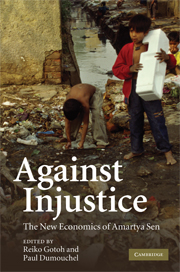Book contents
- Frontmatter
- Contents
- List of figures
- List of tables
- List of contributors
- Acknowledgements
- Introduction
- Part I
- Part II
- 4 The power of a democratic public
- 5 The challenge of gender justice
- 6 Gift, market, and social justice
- 7 Justice and public reciprocity
- 8 Reasoning with preferences?
- 9 Conceptions of individual rights and freedom in welfare economics: a re-examination
- Part III
- 13 Part IV
- Index
- References
5 - The challenge of gender justice
Published online by Cambridge University Press: 18 January 2010
- Frontmatter
- Contents
- List of figures
- List of tables
- List of contributors
- Acknowledgements
- Introduction
- Part I
- Part II
- 4 The power of a democratic public
- 5 The challenge of gender justice
- 6 Gift, market, and social justice
- 7 Justice and public reciprocity
- 8 Reasoning with preferences?
- 9 Conceptions of individual rights and freedom in welfare economics: a re-examination
- Part III
- 13 Part IV
- Index
- References
Summary
Data
Women are unequal to men, all over the world, unequal in basic opportunities and life chances of the sort that lie at the heart of the idea of social justice. Take education. In forty-three countries, male literacy rates are fifteen or more percentage points higher than the female rate; this comprises one fourth of the nations in the world. In secondary education, the gaps are even more striking. Moreover, as is generally not the case with basic literacy, these gaps are actually growing: in twenty-seven countries the secondary school enrollment of girls declined between 1985 and 1997 – and this during a time of rapid technological advancement, in which skills become ever more important as passports to economic opportunity.
Take exposure to violence. Although data are very difficult to come by, it is generally agreed that exposure to violence, both physical and sexual, at the hands of strangers, acquaintances, and intimate partners is a huge fact in female life around the world. The Human Development Report 2000 reports that between 10 and 47 percent of women in the nine countries studied were physically assaulted by an intimate partner. In the United States, intimate partner violence made up 20 percent of all non-fatal violent crime experienced by women in 2001. The National Violence Against Women Survey reports that 52 percent of surveyed women said that they were physically assaulted either as children or as adults. Eighteen percent of women had experienced rape at some time in their lives.
- Type
- Chapter
- Information
- Against InjusticeThe New Economics of Amartya Sen, pp. 94 - 111Publisher: Cambridge University PressPrint publication year: 2009
References
- 1
- Cited by



